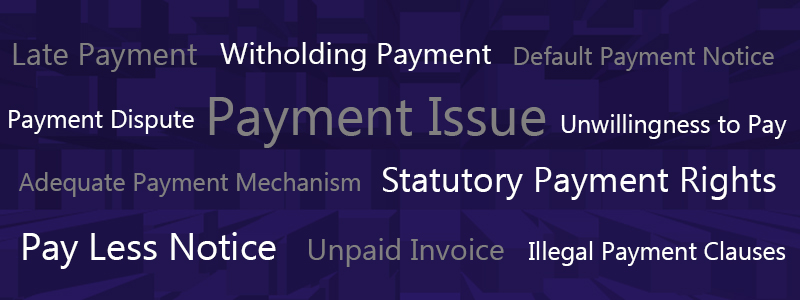Arbicon are construction law specialists, highly experienced in advising Main Contractors, Subcontractors and Building Employers in resolving payment issues. We advise Clients on Pay Less Notices, Payment Notices, late payment issues and default payments. With over 40 years’ experience dealing with construction disputes, we have the expertise to evaluate your position and resolve your dispute through adjudication, a quick ADR process to recover your money.
In the construction industry, payment issues regularly arise through problems with the construction works, overpayment or underpayment, damages/loss, late payment or simply an unwillingness to pay at all. Payment disputes often occur between the Main Contractor and Subcontractor, where the Subcontractor is not paid, or a Pay Less Notice is served. Large sums of money and complex construction projects can be involved, and the total amount payable changes over time, all of which can have an impact and result in a payment dispute. There are numerous reasons why issues with payment occur including:
- Payment Notice failure
- Incorrect Pay Less Notice
- Design failure
- Retention not released
- Professional negligence
- Variations to the construction works
- Scope of Work non-compliance
- Delay in delivery of the works
- Liquidated damages or defects
- Breach of contract/contract termination/suspension/repudiation
- Miscalculation of supplies/timings
- Late payment
- Illegal payment clauses such as ‘pay-when-paid’
- Insolvency
A Statutory Right to Payment
The Construction Acts provide a statutory right to payment for work carried out under a commercial construction contract and clauses that restrict or block payment are illegal. The payment must be calculated and notified by the payer in strict time limits otherwise the payee is legally entitled to the amount they request. Strict management of the payment notification process must be adopted.
Pay Less Notice
If you have received a Pay Less Notice, the payer is stating that they are not going to pay what was requested, or previously agreed. There are instances where a Pay Less Notice will be void, if you do not agree with the Pay Less Notice you have received, Arbicon can provide expert guidance and support in resolving your dispute. The first step is to check if the Pay Less Notice is valid, if it is then it must be tackled head on in formal proceedings or with effective negotiation. Please call us to discuss your individual circumstances or read our advice guide, 'Pay Less Notice Served - What Now?'.
Default Payment Notice
If an invoice or payment application required by the contract is submitted and is ignored or inadequately responded to, or that response is not done in time, then the Invoice/payment application is automatically the legal sum due in default and becomes what is known as the "Default Payment Notice". If payment is not made, the payment dispute can be referred to Adjudication to obtain the correct payment due.
This right has come about as the Construction Industry has suffered for years with a reputation of bad payers ignoring those in need of payment and often the reason behind much insolvency. The law was changed and even though the law has been in force on Default Payment Rights since 1st October 2011, those used to not paying their way have been caught out leading to a number of cases known as "Smash and Grab" adjudications. It is not "Smash and Grab" it is "Pay-up you are in breach of Contract for Non-Payment!".
Put simply the law is….
“If your invoice/payment application is ignored….what you ask for is what you get!” Arbicon can adjudicate and obtain an order to pay.
Late Payment
Any late payment will entitle the injured party to late payment interest, the extent of recovery including costs for pursuing the late payment will depend on what is and is not agreed.
The law dictates that if there is no contract remedy for late payment, you are entitled to simple interest at 8% over the Bank of England Base Rate and reasonable costs of pursuing the debt. The one proviso is that if the contract contains a reasonable remedy for late payment then the Act does not apply. Typically, a JCT contract includes 5% including all interest and costs, that is all that can be recovered.
Illegal Payment Clauses
Clauses such as ‘pay-when-paid’ payment terms, or ‘no payment if a contract is not signed’ are illegal. The only exception is when there is an ‘insolvency of the Employer’ clause, which is when the Employer goes bust the contractor does not have to pay the subcontractors.
Adequate Payment Mechanism
Construction contract payment clauses must also have an "adequate payment mechanism". The key components for payment must be present, showing how payments become due and when are they paid. If there are no terms or an "inadequate payment mechanism" the Scheme applies. The Scheme is like a default set of contract terms that work with the Construction Acts, which apply when a term is missing in the contract in relation to payment and adjudication. If you have not agreed any terms you are likely to be better off and there is always an adequate payment mechanism that exists.
If you have any payment issues or have received a Pay Less Notice and need advice, please use our contact form or call one of our offices.

